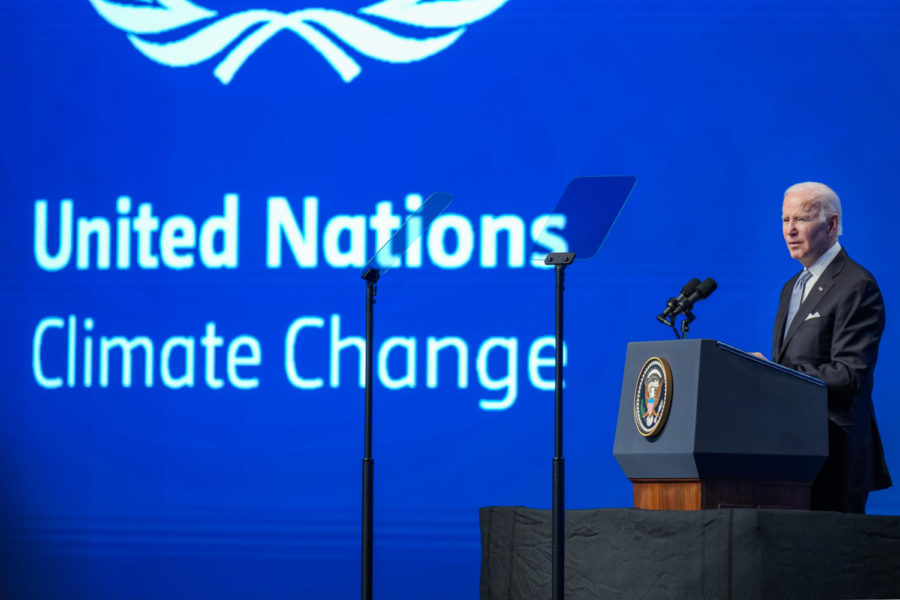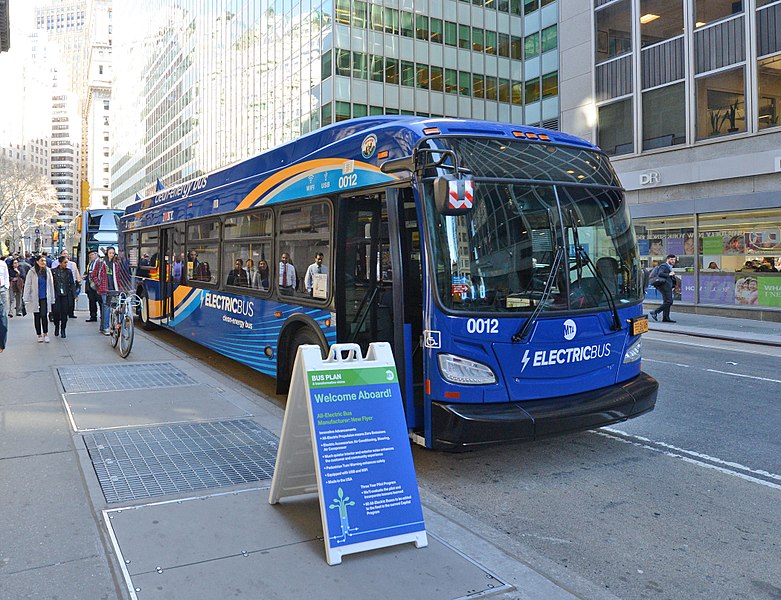Biden’s Push With the Climate Change Agenda: A Step Back in the Federal Government’s Efforts
Biden’s plans are to create a greener planet, starting with the United States. But are we really going greener or being greenwashed?
In 2015, the world’s first Climate Clock was created, a constant reminder of the rapidly closing window of time to act to reverse or halt our damage. In efforts to do so, the world has turned its attention to electrical alternatives, including greener renewable energy. In a bold move towards sustainable transportation, President Biden has unveiled an ambitious plan to accelerate the adoption of electric vehicles (EVs) in the United States, paving the way for a cleaner and greener future. The initiative not only aims to combat climate change, but also seeks to boost economic growth, create jobs, and enhance energy independence. Now, more and more companies are seeking a place in the potential exponential growth through funding, offering less ethical tactics to stake in their grounds.
Let’s start from the beginning: Biden’s plan outlines a significant investment of $174 billion over ten years to revitalize the Electric Vehicle (EV) market. The initiative encompasses several key aspects: expanding EV charging infrastructure, providing incentives for consumers to purchase EVs, supporting domestic manufacturing, and transitioning the federal vehicle fleet to electric power.
The plan hopes to establish the United States as a global leader in EV manufacturing by prioritizing the development of a domestic supply chain. The electric car push holds significant economic potential, expecting to generate millions of well-paying jobs, particularly in areas of EV production, battery manufacturing, and charging infrastructure installation. Furthermore, it will foster innovation, research, and development in clean energy technologies, positioning the United States at the forefront of the green economy.
To facilitate the widespread adoption of EVs, Biden’s plan includes a significant investment in charging infrastructure. Expanding the network of charging stations across the country is crucial to alleviate range anxiety, increase consumer confidence, and encourage EV adoption. A robust charging infrastructure will enable EV owners to travel longer distances, foster electric vehicle ownership in urban and rural areas alike, and promote the convenience of electric mobility. One of the key requirements, and also the most susceptible parts of this development is the need for collaboration with both the public and private sectors to establish a comprehensive and reliable charging network.
These goals are a part of Biden’s efforts to address climate change and reduce greenhouse gas emissions. Transportation is a major contributor to carbon dioxide emissions, and transitioning from traditional internal combustion engines (ICEs) to electric vehicles will play a crucial role in decarbonizing the sector. By promoting the adoption of EVs, the administration and most of the public hope to decrease the reliance on fossil fuels by adopting renewable energy sources to power electric grid lines and EV charging stations. Doing so would decrease carbon emissions, improve air quality, and mitigate the environmental impact of transportation, creating a cleaner and healthier planet.
Furthermore, as EVs largely rely on electricity, the plan also presents an opportunity to transition from imported oil to domestically produced renewable energy sources. By promoting the use of renewable energy and integrating it with EV charging infrastructure, the United States can harbor a number of golden virtues, such as its energy independence and reduce vulnerability to geopolitical tensions and oil price fluctuations. This shift will also contribute to diversifying the energy mix, promoting cleaner energy alternatives, and enhancing the nation’s long-term energy security.
Moreover, Biden’s electric car push is anticipated to have a ripple effect beyond the borders of the United States. As the world’s second-largest car market, the adoption of EVs in the United States can significantly impact the global automotive industry. The increased demand for electric vehicles will drive economies of scale, resulting in more affordable EVs worldwide. Additionally, the plan’s focus on bolstering domestic manufacturing and supply chains may influence global trade dynamics, encouraging other nations to enhance their own EV manufacturing capabilities and stimulate sustainable economic growth.
We certainly do see this growth currently, as buses, taxis, and cars are being replaced with dual-fuel or electric vehicles more than ever before. Today, New York City alone has over 158,000 electric vehicles and 7,030 public charging stations, 1,559 of which are free EV charging stations.
But is this plan really greener? Or are we being greenwashed? Greenwashing refers to the practice of conveying a false impression or misleading information about the environmental benefits of a product, service, or organization. It can also be applied to political actions when politicians create the appearance of being environmentally friendly or take significant steps towards sustainability without implementing substantial changes or policies.
While the electric car push presents immense opportunities, there are several challenges and considerations that need to be addressed. The plan’s success relies on collaboration among federal, state, and local governments, as well as private industry stakeholders. Overcoming regulatory hurdles, ensuring affordability and accessibility for all communities, and managing the transition for workers in the traditional automotive sector are critical aspects that require attention. Moreover, the environmental impact of battery production and disposal, as well as the sourcing of critical minerals, must be carefully managed to ensure a truly sustainable transportation system.
Despite the concept of electric vehicles having its set of merits and concerns, Biden’s administration, and this bill in particular, has opened a gate to channel lobbying efforts. As former President Trump left office, he left behind prioritized maintenance of close relationships with battery companies, who were keen on mining critical minerals. When Trump stepped out, Biden stepped into a new quite interesting position. These battery companies had already hooked on major oil fix wins with Biden from their previous links to bills. Now, with the 2021 infrastructure and this EV bill, they’re already on their way.
Based on the setup left by former President Trump, which prioritized the maintenance of close relationships with battery companies keen on mining critical minerals, Biden is in an interesting spot. These companies had already hooked on through major oil fix wins with Biden, and are working their way up to secure the 2021 infrastructure bill and now they’re already on their way.
Not only is Biden’s bill partially sponsored by lobbying, most bills and the response to them are influenced by it. Ethos-disguised legislation such as this one is usually the byproduct of the process which makes Washington’s elite so hated by the American public. Blinded by the monetary gains, extreme views are pushed and there is virtually no room for negotiation and therefore, effective action towards resolution.
Regarding the concept of lobbying, there are several perspectives about its usefulness and necessity. Some regard lobbying as a necessary tool to promote democratic participation. It is possible to create more activity in Congress, since more legislation is likely to be passed with incentivized goals. This means it can also aid Congress to prioritize certain interests of the public over private gain, depending on the case, and it can certainly serve as an educational opportunity for legislators. On the flip side, lobbying is most publicly recognized as a power of influence only accessed by the rich. It may encourage lawmakers, but only for monetary compensation, and in some organizations, all a congressional member has to do is sign their name and state. This can lead to unfair competition between competition and industries.
While one side argues that the world has crossed the line for irreversible damage every ten years from 1956 to now, others argue that it will put many Americans who are already working in the energy sector out of business, and put an economic strain on Americans as energy prices increase. All in all, it is already a fact that most Democrats including President Biden are receiving monetary gains from lobbyists funded by renewable energy corporations to push legislation promoting federal spending towards the expansion of their industry. It is the same for the other end, as conservatives are famous for receiving political and monetary gains from companies like the N.R.A. and B.P. to continue their operations in the U.S.
In the end, there’s more of an uproar on the origins and moral integrity of the bill rather than the actual effects on the climate. These conflicts force us to recognize which fight is worth fighting for, and when to do so. Here, those not in the know can be bought into “media inflation” which makes the EV bill sound like a savior against greenhouse gas emissions. Contrastingly, several honest congress members still have mixed feelings about extending limited budgeting in a not-so-promising idea of EV conversion.
While the electric car push presents immense opportunities, there are several challenges and considerations that need to be addressed.
Eyenain Misgar is a Spotlight Editor for 'The Science Survey.' Eyenain finds the most appealing aspect of journalism to be the coverage and inspiration...












